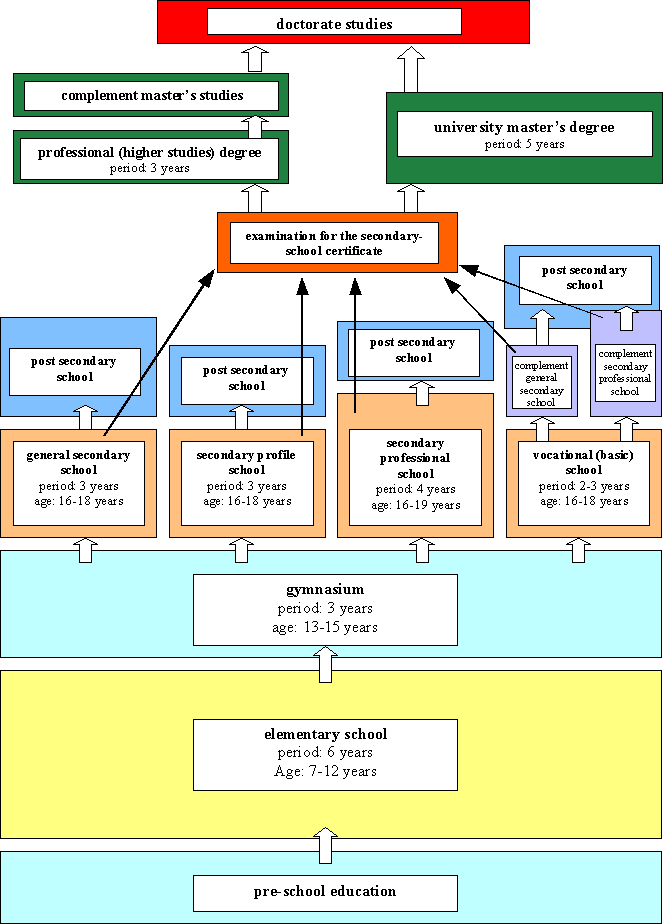The Polish School System Posted by Kasia on Nov 19, 2010 in Culture
When I was a student in Poland, the school system was slightly different than it is today. The present educational system in Poland was introduced in 1998/1999. Many things were changed concerning administration, financing, inspection, supervision, guidance, teachers’ rights and duties.
Pre-school education also underwent certain changes.
According to the new Educational Act of 2002, pre-school education is treated as the first level of the education system and starting from 2003/2004 school year it is compulsory (przymusowy) for children of six years old. This education stimulates the general development and gives the primary reading skills and basic mathematics.
Students of 7-12 attend primary school, which is also compulsory. Primary education is divided into two cycles: the first cycle (grades 1-3) at which beginning learning is offered, and the second cycle (grades 4-6) at which systematic learning is provided. Primary schools operate on the basic of general educational plan, which determines the minimum weekly number of lesson periods of particular subjects. The main components taught at the lower level of the primary school (grades 1-3) re: Polish language, social and natural environment and mathematics, crafts and technology, art and music and physical education. In the lower grades one teacher teaches all subjects, while in the higher grades each subject has a different teacher and usually students change classroom for each subject.
After completing primary school students can choose different secondary education, which is free of charge. General secondary schools provide students with general education, with the possibility of receiving the graduation certificate of general education. Those who have passed the final examination called matura may apply to universities. Those who do not want to study at the university and those who have not taken the matura examination may continue their education in post – secondary vocational schools.
Secondary schools of vocational education prepare qualified workers and others with equivalent qualification. They also provide general secondary education. The purpose of these schools is to meet the demand for qualified workers, and they also provide young people with the opportunity of acquiring secondary education and taking the matura examination.
Students can choose post-secondary education. They are trained as nurses, accountants, administrative personnel for enterprises and hotels, computer specialists, librarians and many others.
After secondary school students can take higher education. There are various types of higher education institutions in Poland.
We have such institutions as: universities, polytechnics, economic academies, agricultural academies and others. The biggest academic center is Warsaw, which has the largest student enrolment, the greatest number of higher education institutions and the largest number of teachers. Other big cities like Kraków, Wrocław, Poznań, are very popular as well. A lot of students choose Warsaw, because it is easier to find a job there. But other big cities are more famous for overall nice student environment.
Day studies in state higher schools are free of charge.
There are also a lot of private Universities. Some of them are really good, others not so much.
After you complete University you may continue with the Doctorate studies.
Here is some educational vocabulary:
Pre – school education – przedszkole
Elementary school – szkoła podstawowa
Gymnasium – gimnazjum
High school – liceum
Vocational school – szkoła zawodowa
University – uniwersytet
Polytechnical – politechnika
Academy – akademia
Doctorate studies – studia doktoranckie
Student – student
Teacher – nauczyciel
Proffesor – profesor
Dorm house – akademik
Grades – oceny
I tried to gather as much information about the school system as I could. I haven’t lived in Poland for a while now, so if I missed something – please let me know in comments below.
Do następnego razu! (Till next time…)

Build vocabulary, practice pronunciation, and more with Transparent Language Online. Available anytime, anywhere, on any device.
About the Author: Kasia
My name is Kasia Scontsas. I grew near Lublin, Poland and moved to Warsaw to study International Business. I have passion for languages: any languages! Currently I live in New Hampshire. I enjoy skiing, kayaking, biking and paddle boarding. My husband speaks a little Polish, but our daughters are fluent in it! I wanted to make sure that they can communicate with their Polish relatives in our native language. Teaching them Polish since they were born was the best thing I could have given them! I have been writing about learning Polish language and culture for Transparent Language’s Polish Blog since 2010.





Comments:
duklecia:
Thank you for this. As a learner of polish language and culture I need to know about the eduacation system and you explaned it very good.
Tomasz Kulicki:
Is it OK when you say that “gimnazjum” (Polish) is “gymnasium” (English)?
I was taught it’s a false friend and the equivalent of “gimnazjum” in English is “junior high school” (Amer.) or “junior secondary school” (Brit.).
And “gymnasium” is a place where you play games, do exercises and body-building, isn’t it?